Iranian MP Says Houthi Attacks On Israel Follow Khamenei Wish
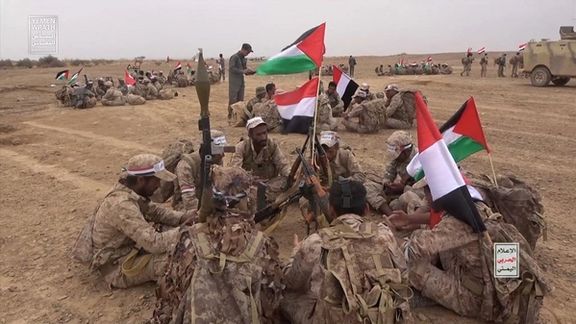
An Iranian ultraconservative lawmaker claims Houthis have targeted Israeli ships following public statements against Israel by Iran's ruler Ali Khamenei.

An Iranian ultraconservative lawmaker claims Houthis have targeted Israeli ships following public statements against Israel by Iran's ruler Ali Khamenei.
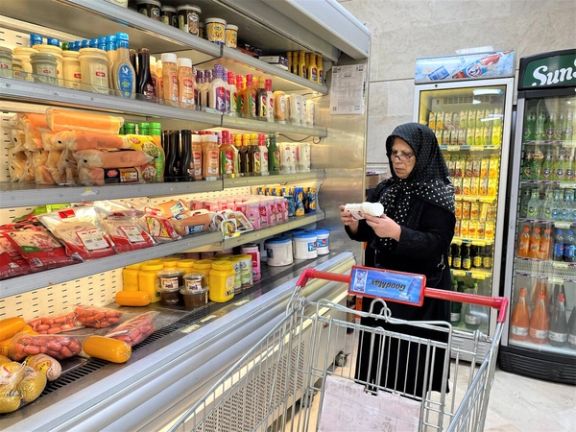
The inflation rate in the past Iranian month was its highest in two years as the government grappling with large budget deficits continues to print money.
According to the latest data released by the Central Bank of Iran (CBI), the inflation rate in the country has surged to its highest level in the past 22 months, hitting 54.8% for the month of Mehr (ended October 22), economic website EcoIran reported, after analyzing data released by the CBI. The central bank rejected the report as false, insisting that the inflation is about 45 percent. It claimed that there were discrepancies in calculations.
EcoIran says the number is based on the Central Bank's tables, which are presented periodically to the judiciary to calculate overdue debts, fines, and dowries. The CBI rejected EcoIran’s figure as “wrong” but did not elaborate on the table presented in its document.
The Statistics Center of Iran (SCI) and the CBI claim that the rate of annual inflation has dropped to 45.5 percent, nearly the same level as a year ago, but some things cannot be denied via changing technical definitions. Food prices have risen much faster than the official inflation rate, in some instances hitting 100-percent in 2022. ILNA news agency reported this week that the decline in people's purchasing power is so steep that some workers are surviving the second half of the month with just eating "one egg a day."
The central bank and the ministry of the economy stopped issuing regular and precise economic data in 2019 as US sanctions imposed the previous year pushed an already struggling economy into a deep recession. In the absence of credible data by the Central Bank of Iran about inflation, Iran's Statistics Center became the primary official entity announcing these figures. Government officials and the central bank usually announce lower inflation figures for consumer goods.
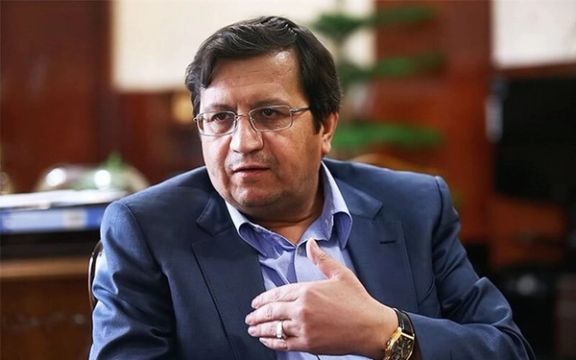
Iran’s former chief banker Abdolnaser Hemmati, an outspoken critic of the current administration’s economic policies, said Wednesday that the government has failed to control inflation or the devaluation of the rial. He said that the measures the Raisi’s administration has taken to control the economy has led to “an economic repression and more rente in the currency market," a French term used in Persian to imply privileges resulting from undue influence.
The currency has lost its value 12-fold since 2018 when the United States withdrew from the JCPOA nuclear accord and imposed sanctions. The rial has also lost about 80 percent of its value compared to mid-2021 and close to 50 percent since December 2021.
The government is desperate to control the currency market hoping that it can artificially keep the Iranian rial high. It created multiple exchange rates for rial against the dollar and other foreign currencies, providing subsidies – or cheaper dollars – for the import of essential items. However, the system is manipulated by regime insiders or businesspeople with government connections.
Hemmati said that during the past seven months (since the start of the Iranian year in March) the CBI has supplied $20 billion via a special currency scheme known as NIMA. Exporters have to bring back hard currencies they earn to Iran and sell it at a cheaper rate to the government, which then makes it available to importers at less than than the market exchange rate. He elaborated that the 30-percent discount on the exchange rate provided in NIMA has amounted to an equivalent of $4.4 billion, claiming that about 50 to 100 percent of this amount is pocketed by intermediaries or importers with close links to the regime.
Mohammad Aram, the Deputy for Foreign Exchange at the Central Bank, announced earlier in the week that a total of $42 billion has been provided since March, a three-percent rise in comparison to the corresponding period last year. According to him, the Ministry of Industry, Mining, and Trade received $26.6 billion, the Agriculture Ministry received $10.4 billion, and the Health Ministry received $2.7 billion for importing their needs.
The US dollar is set at 285,000 to the rial in the special government scheme versus the free market where it is traded at about 510,000. The discrepancy between the two breeds corruption, as well-connected individuals and companies can buy cheap dollars through NIMA and instead of using it to finance imports, sell it on the currency market.
Numerous cases of such corruption have been revealed since 2018. The government also regularly sells dollars through the free market to currency dealers to support the beleaguered rial. Usually, these interventions have a limited and temporary effect.
Donya-e-Eqtesad, Iran’s most popular economic newspaper highlighted the paradox this week that the government is providing more foreign currency for the import of essential goods, but they are growing increasingly scarce in the market.
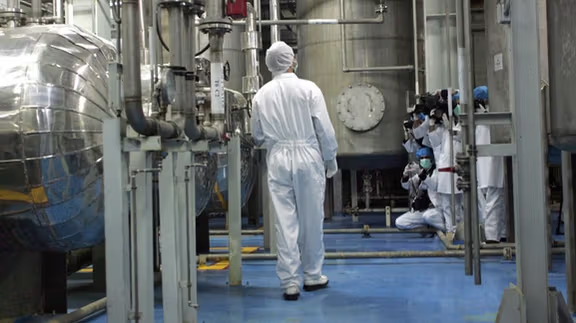
Iran has enough uranium enriched to up to 60% for three atom bombs and is still stonewalling the agency on key issues, confidential IAEA reports showed on Wednesday.
Iran's stock of uranium enriched to up to 60% grew by 6.7 kg (14.8 pounds) to 128.3 kg (282.9 pounds) since the last report on September 4, one of the two reports to member states seen by Reuters said. That is more than three times the roughly 42 kg (92.6 pounds) that by the IAEA's definition is theoretically enough, if enriched further, for a nuclear bomb. Weapons-grade is around 90% purity.
In the second report issued on Tuesday, the agency said there still had been no progress on two pressing issues in Iran: getting more monitoring equipment re-installed after it was removed at Tehran's behest last year and getting answers on the origin of uranium particles found at two undeclared sites.
It is the second time in a row that the IAEA's quarterly reports have said there was no progress on either issue.
Negotiation since April 2021 to revive the Obama-era JCPOA nuclear deal have failed to make progress, and Iran continues to expand its nuclear program. The previous US administration withdrew from the agreement in 2018 and imposed harsh economic sanctions. Iran retaliated by starting to violate the JCPOA limits and substantially increased both the quantity and the quality of its uranium enrichment. It also reduced monitoring by the International Atomic Energy Agency.
Iran did not agree to a compromise plan proposed by the European Union in 2022 to revive the agreement, despite the Biden administration’s stated goal of finding a diplomatic solution.
There also had been no progress in getting Iran to reverse its so-called "de-designation" in September of some IAEA inspectors assigned to the country.
The move effectively barred some inspectors, who diplomats said were from France and Germany and the IAEA said were among its most experienced experts, from working in Iran.
Tehran's move, which the IAEA called "disproportionate and unprecedented", was in response to a call on Iran by the United States, France, Britain and Germany at the IAEA's 35-nation Board of Governors to give credible explanations on the uranium particles and let the IAEA install more surveillance cameras. In fact, the Western powers did not pursue any censure of Iran as expected, and simply issued a rebuke.
"This measure, while formally permitted... was exercised by Iran in a manner that directly and seriously affects the Agency's ability to conduct effectively its verification activities in Iran, in particular at the enrichment facilities," the second IAEA report said.
"The (IAEA) Director General (Rafael Grossi) continues to strongly condemn Iran's sudden withdrawal of the designations of several experienced Agency inspectors," it added.
Washington has informally relaxed sanctions on Iran’s oil exports and allowed blocked funds in Iraq and South Korea to be released, but Tehran has shown no willingness to resolve the nuclear issue.
US officials and experts believe that having stockpiled enriched uranium, Iran can build a bomb in a matter of months. It can be considered as a nuclear threshold state.
With reporting by Reuters
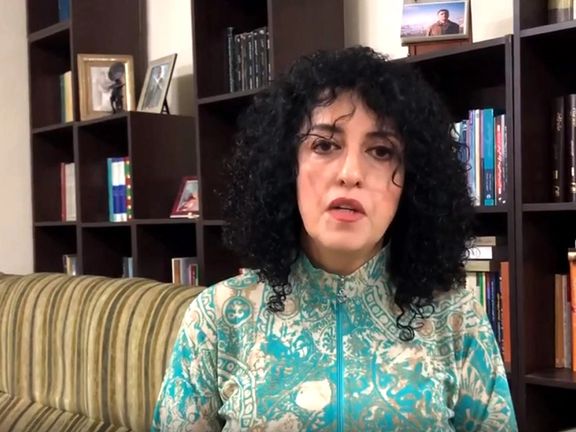
Narges Mohammadi, the imprisoned Nobel Peace Prize laureate, was once again denied medical care for refusing to wear the mandatory hijab.
In a post on her Instagram, an audio file was shared in which female prisoners chant, "Prisoners, Support, Support!"
Originally scheduled for a cardiac angioplasty on Wednesday, Narges Mohammadi's transfer from Evin Prison to the hospital was thwarted, citing her refusal to comply with mandatory hijab, a position she has stood firm on during her years in and out of detention.
Medical tests conducted last week revealed Mohammadi's critical health condition, including "blockage in two heart arteries, fluid accumulation around the heart, and severe inflammation of the gallbladder."
Mohammadi had previously reported her transfer to the hospital on November 8, without a headscarf and wearing a business suit. However, she returned to prison shortly afterward.
Since November 6, Mohammadi had been on a hunger strike in protest against the "Islamic Republic's policy of delaying medical attention for sick prisoners, risking the health and lives of human beings" and "the policy of death or compulsory hijab for Iranian women." She was refusing to comply with hijab laws in exchange for treatment.
Following her civil rights activism, Mohammadi was awarded the Nobel Peace Prize in 2023. International human rights organizations, including Reporters Without Borders, strongly condemned denying Mohammadi access to medical care, and the Nobel Committee expressed severe concern about her health.
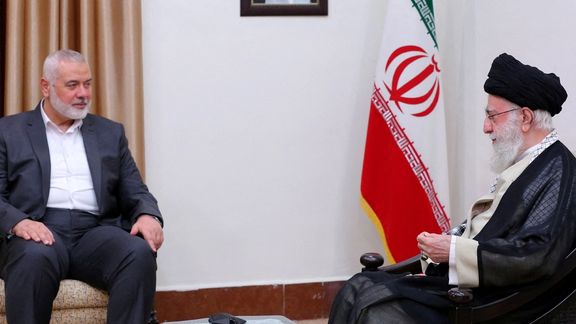
Iranian regime officials claim they had no warning of the October 7 invasion of Israel by its proxy Hamas, according to Reuters.
The claims come as the world’s eyes are on Tehran, which has long funded the group designated a terror organization by the likes of the UK and US. Tehran has also provided military, technical and operational support to Hamas for years.
According to Reuters, three sources have claimed that “Iran's supreme leader delivered a clear message to the head of Hamas when they met in Tehran in early November … You gave us no warning of your Oct. 7 attack on Israel and we will not enter the war on your behalf.”
This message apparently delivered by three regime officials contradicts a string of meetings between the top echelons of the Islamic Republic and leaders of both Hamas and Iran-backed Lebanese Hezbollah, over the course of this year. This went as high up as the Supreme Leader when in April, Hamas announced that its political leader, Ismail Haniyeh, was visiting the Supreme Leader in Tehran.
Reuters claims that on this latest visit earlier this month, “Ayatollah Ali Khamenei told Ismail Haniyeh that Iran -- a longtime backer of Hamas -- would continue to lend the group its political and moral support, but wouldn't intervene directly.”
As soon as war broke out, the US voiced its support of Israel, sending warships and personnel to the region, fearing a wider escalation with Iran at the helm.
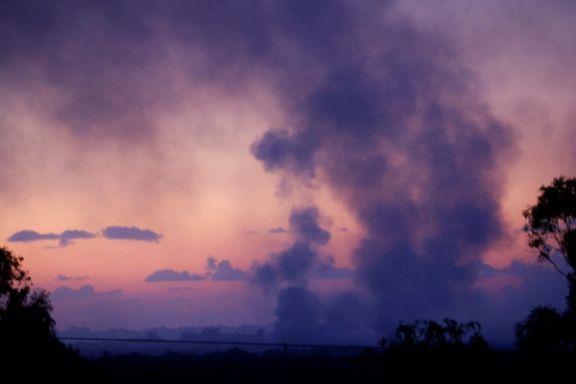
Iranian officials have repeatedly made the claim that they were not involved in the terror attack, but the government immediately on October 7 praised the invasion and ordered street celebration, with large banners erected within hours.
Yet regime and Hamas sources speaking to Reuters claim “The supreme leader pressed Haniyeh to silence those voices in the Palestinian group publicly calling for Iran and its powerful Lebanese ally Hezbollah to join the battle against Israel in full force”.
While Hamas and Hezbollah leaders had met with increasing frequency in the lead up to the attack which was to be the most deadly single day for Jews since the Holocaust, with the murder of 1,200 mostly civilians and a further 240 taken hostage, regime insiders dispute Hezbollah also had knowledge of the devastating attack which was to take place.
“Hezbollah too, was taken by surprise by Hamas' devastating assault last month that killed 1,200 Israelis; its fighters were not even on alert in villages near the border that were frontlines in its 2006 war with Israel, and had to be rapidly called up,” Reuters reported.
One Hezbollah commander told the news agency, ”We woke up to a war”, in spite of multiple meetings in recent months.
The latest statements distancing himself from the war, which has seen Iranian proxies in Lebanon, Syria, and Yemen launch attacks on Israel, will shock the Supreme Leader’s domestic audience who have for years heard his cries of annihilating the Jewish state and his ‘final solution’.
On Israel’s northern border, Hezbollah has engaged in the heaviest clashes with Israel for almost 20 years, but has avoided a full-fledged war. Speaking to Israel Today, Middle East expert Professor Meir Litvak reiterated the final command of its proxies will always come from Khamenei.
“Khamenei detests Israel with all his heart and wishes for its destruction. He also did not hide his great joy at what happened to us. However, he is cautious. He does not want direct Iranian involvement, and it is very important to him that there be no Israeli hit inside Iran. That is why he is determined and sophisticated in using his proxies, Hezbollah for example, who will do the job,” he said.
“Khamenei had an opportunity on October 7, but he also has a historical vision, so he is not in a hurry to destroy Israel right now. His ideological view is that Israel's blood must be shed, brought to its collapse so that it will submit to Iran's demands and no longer exist as a Jewish state.”
In what appears to be the most coordinated attack since the regime was founded in 1979, it seems unlikely that Tehran has not been at least highly informed of operations at the highest levels. Jason Brodsky, policy director at United Against A Nuclear Iran, noted the Reuters report’s sourcing. “It's Iran's regime and Axis of Resistance, so what they're telling Reuters is meant to protect Tehran. A lack of Iranian foreknowledge of October 7 is hard to believe,” he said.
"But Tehran not intervening directly, only through proxies, as well as Khamenei's frustration of Hamas operatives complaining about Iran's regime's support and requests to silence them are more believable,” he added.
Iran-backed proxies have even attacked US forces in Iraq and Syria, triggering fears of a full scale war. But as the US now enters discussions with Iran to unfreeze yet more funds, the likelihood is that Tehran knows it is the time to step back.
Last month, Iran’s foreign minister said that US officials had tried to discuss restarting nuclear talks but insisted Washington must first release $10 billion of Tehran's frozen funds as a sign of good will.
Indirect talks to revive the 2015 nuclear accord broke down in June and Iran has since rejected direct talks with the United States.
However, while Iran has billions of dollars of its frozen assets in foreign banks, mainly from exports of oil and gas, which it cannot access due to US sanctions on its banking and energy sectors, the war in Gaza and annihilation of Israel, may be lower down the list.
Earlier this year, the US unblocked $6bn from south Korea in exchange for the release of five dual-nationals held in Iran, a move which drew international condemnation fueling fears of its emboldening the regime and reinforcing its diplomatic hostage policy.
As Iran’s economy is on its knees and the world watches the number one sponsor of state terror, according to the US, and its next moves, it is perhaps playing a long game.
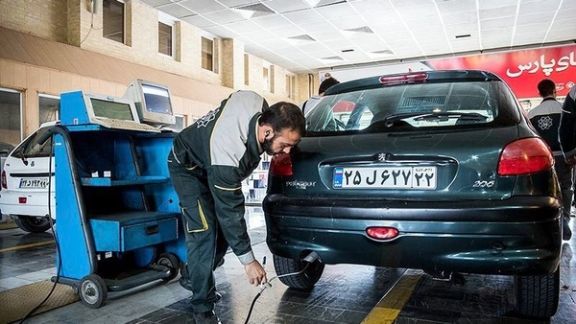
Iranians, unable to afford proper repairs, are resorting to renting car parts to secure technical inspection certificates, putting citizens' lives at risk.
Shadi Maleki, the CEO of the Technical Inspection Headquarters of Tehran, speaking to the ISNA news agency, highlighted a growing issue where some vehicle owners are using rental parts, particularly catalytic converters and tires, to pass mandatory technical inspections.
Catalytic converters, crucial for reducing air pollution by purifying toxic gases from fuel combustion, have become mandatory in inspections. With most of Iran’s cars unroadworthy, it has bred a black market for parts to help ensure they pass under new regulations.
Maleki explained that the absence of the catalytic converter's serial number on vehicle cards makes it challenging to identify rental parts during inspections.
The situation is exacerbated by economic challenges in Iran where people cannot afford to upgrade their cars. This has been exacerbated as drivers faced a recent 30% increase in insurance premiums.
Furthermore, recent reports on October 14 revealed that the Ministry of Industry has approved a 20% increase in the price of car tires, adding to the financial burden on vehicle owners.
A decade-long lack of economic growth, coupled with international sanctions impacting oil export revenues, has strained the country's financial stability.
The situation raises concerns not only about the safety of vehicles on the road but also underscores broader economic challenges that Iranians are grappling with. High inflation rates, increasing poverty levels, and the pressing issues of road accidents and pollution further compound the complexity of the situation.
Mahmoud Abbaszadeh-Meshkini, who sits on the Parliament’s National Security and Foreign Policy Committee, said, “Resistance forces are prepared to handle a variety of scenarios.”
Ali Khamenei and President Ebrahim Raisi have urged Islamic countries to impose economic sanctions against Israel since its retaliatory strikes against Hamas and the ground offensive in Gaza. Tehran demanded an oil embargo and measures to impede Israeli trade.
The Houthis are part of the so-called "Axis of Resistance" which also includes Lebanon's Hezbollah; a coalition of Iranian-supported armed groups that fight Israeli and American forces in the region.
Following Hamas' attacks on Israel on October 7, which killed 1,200 people, Iranian proxy forces have attacked American and coalition troops in Iraq and Syria and launched missiles toward Israel.
In a statement released yesterday, the Houthis, who control Yemen's capital amid a civil conflict, vowed to attack Israeli ships in the Red Sea and Bab-el-Mandeb Strait, which is a critical route for trade and oil tankers.
"Exports of oil and food to the Zionist regime must be blocked," Khamenei said in a televised address on November 1.
Similarly, as part of his 10 proposals at the Arab Summit in Riyadh, President Ebrahim Raisi proposed a boycott of Israeli goods and a cutoff of all economic relations with Israel, primarily in the area of energy.
Meshkini has also initiated an impeachment proceeding against the Iranian foreign minister, in protest over government policies which he claims are too soft towards Israel.